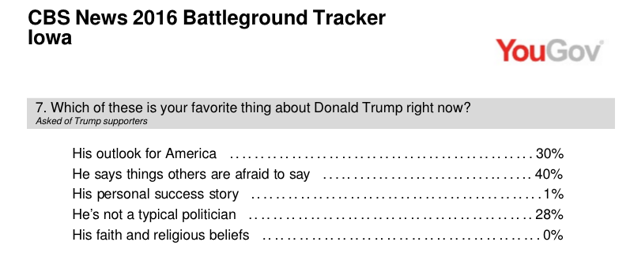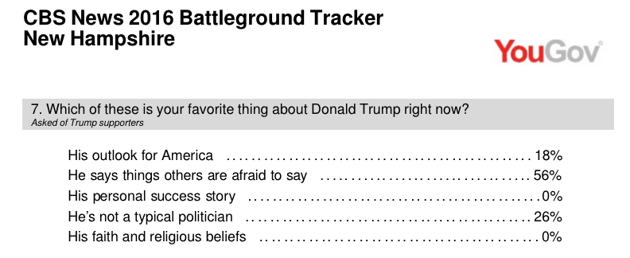Donald Trump's Eventful and Fact-Free Weekend
The Republican frontrunner claimed Muslims in New Jersey cheered 9/11, defended the beating of a black protester, and circulated false and racially-charged crime stats. And that was just since Friday.
Over the last few days, Donald Trump has made the following statements:
- He twice claimed—despite no evidence that it happened—that “thousands” of Muslims in northern New Jersey were cheering as the Twin Towers of the World Trade Center collapsed on September 11, 2001;
- He gave support to people who beat up a Black Lives Matter protester at one of his rallies, calling the activist “disgusting” and saying “maybe he deserved to get roughed up.”
- He tweeted statistics that vastly overstate the percentage of homicides committed by blacks.
In other words, it was a fairly typical weekend for the Republican presidential frontrunner.
Presidential prognosticators are long past the point of declaring that any particular outlandish policy endorsement or unsubstantiated claim would be the one that would doom Trump's seemingly far-fetched 2016 candidacy. The billionaire’s staying power has made fools of plenty of those pundits, and the latest polls suggest that Trump’s success has come not in spite of his famously loose lips, but because of them.
CBS News on Sunday released surveys of Republicans in the two early voting states, Iowa and New Hampshire. Both found Trump with commanding leads and maintaining the support of just under a third of the GOP primary electorate.In Iowa, he held steady while Ben Carson fell to third place behind Ted Cruz, while in New Hampshire Trump’s percentage was more than double that of his nearest rival. Yet the most interesting finding came when the pollsters asked Trump’s supporters (as well as Carson’s) what their “favorite thing” about the candidate was. In both states, the clear winner was, “He says things others are afraid to say.” Hardly any respondents said they were most drawn to Trump’s “personal success story”—which is more or less the stated rationale for his candidacy. Nor did many people cite his “outlook for America,” which despite his ubiquitous slogan is generally pretty grim. About one-quarter of Trump supporters in each state pointed to a more general but related reason: “He’s not a typical politician.”


Trump has always been well aware of this key source of his appeal. He’s been railing about the scourge of “political correctness” for months, and he’s accurately observed that a sizable segment of the population is tired of it. The truth has never mattered much to him—recall that his transition to national politics was itself built on the lie that President Obama was born outside the United States.
Trump’s sustained support is less surprising in light of other polls showing how disconnected many voters, of all political persuasions, are from basic facts. Trump may get his facts wrong, but often, he’s saying things that much of his party believes to be true. Many conservative voters bought into myths about Obama’s identity for years, while a Bloomberg poll released earlier this month found that a majority of Republicans—53 percent—believed the unemployment rate has risen during the Obama presidency. In fact, it has fallen for nearly all of his tenure.
On Sunday, ABC’s George Stephanopolous confronted Trump about his assertion that “thousands and thousands” of Muslims in Jersey City were cheering the 9/11 attacks. The exchange, like Trump’s claim, was typical. “The police say it didn’t happen,” Stephanopoulos said. “It did happen. I saw it,” Trump replied. He probably won’t admit he was wrong, but the tell will be whether he continues to make the claim in his speeches.
In another Sunday interview, Trump defended attendees at his rally in Alabama who punched and kicked a black protester. “Maybe he should have been roughed up, because it was absolutely disgusting what he was doing,” Trump said on Fox News. “I have a lot of fans, and they were not happy about it. And this was a very obnoxious guy who was a trouble-maker who was looking to make trouble.”
Later in the evening, Trump tweeted a set of stats with the image of a menacing, gun-wielding dark-skinned man. It claimed that the vast majority of both black and white homicide victims are killed by black people. The statistics, according to CNN, were sourced to a government agency that doesn’t exist and come from 2015 data that, in all likelihood, is not available yet. FBI statistics from 2014indicate that the overwhelming majority of white homicide victims are killed by other whites. The tweet was retweeted by nearly 7,000 accounts and “favorited” by another 9,000. As of midday Monday, it had not been deleted.
Trump has faced little political blowback for his fact-free style of campaigning in part because his Republican rivals seem to have given up on attacking him for it. Despite lagging badly in the polls, New Jersey Governor Chris Christie passed up an opportunity to take Trump to task for his comment about Muslims in his state cheering on 9/11, perhaps because he is also trying to project a hawkish policy on confronting radical Islam. Ben Carson has shown little desire to engage Trump directly on any topic, much less on his racially-insensitive comments or tweets. The media has spent plenty of time fact-checking Trump, but in a battle between The Donald and the mainstream media he relentlessly attacks, who are his diehard supporters going to trust?
Trump may be the anti-politician, but he’s savvy enough to know how to play to his base, and his base loves him because he’ll say what others won’t—even if that’s because it just isn’t true.






